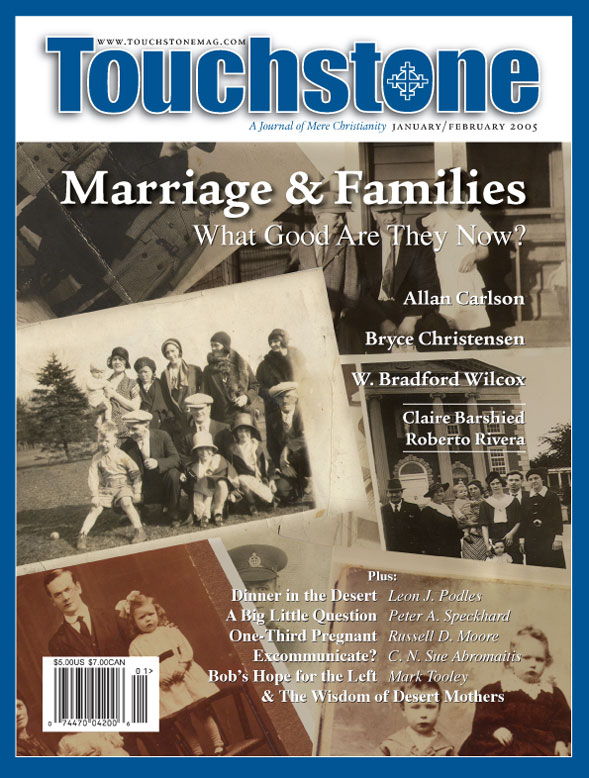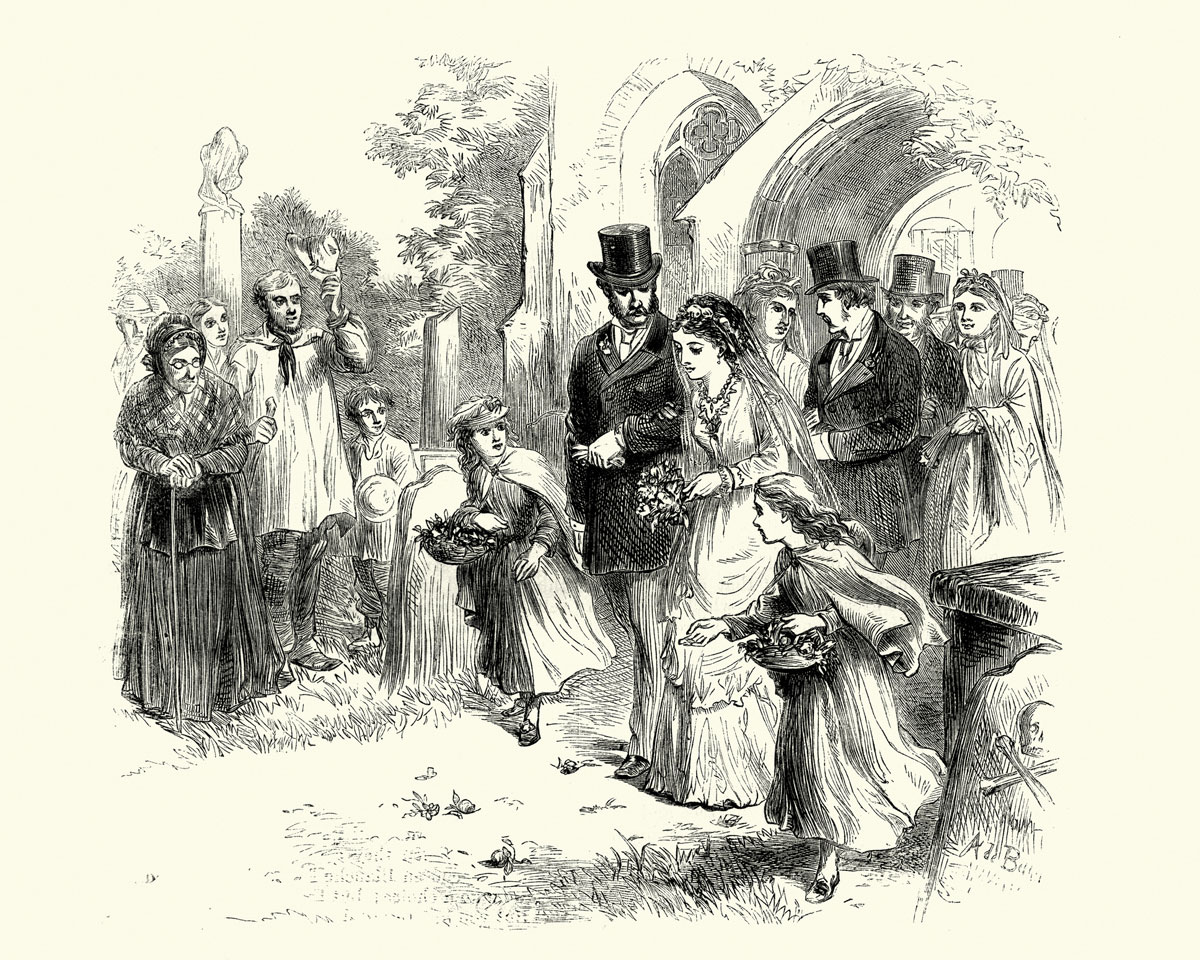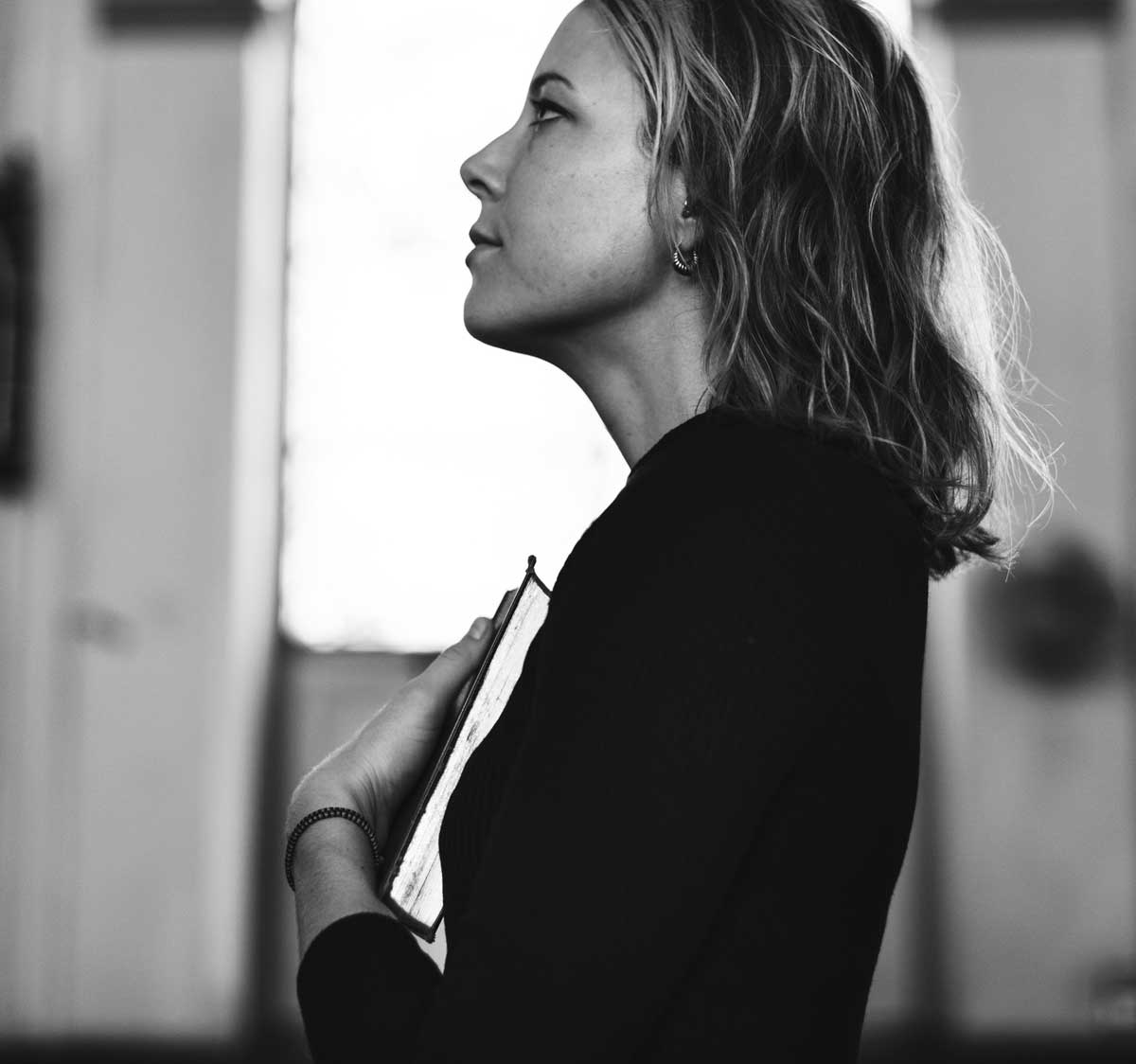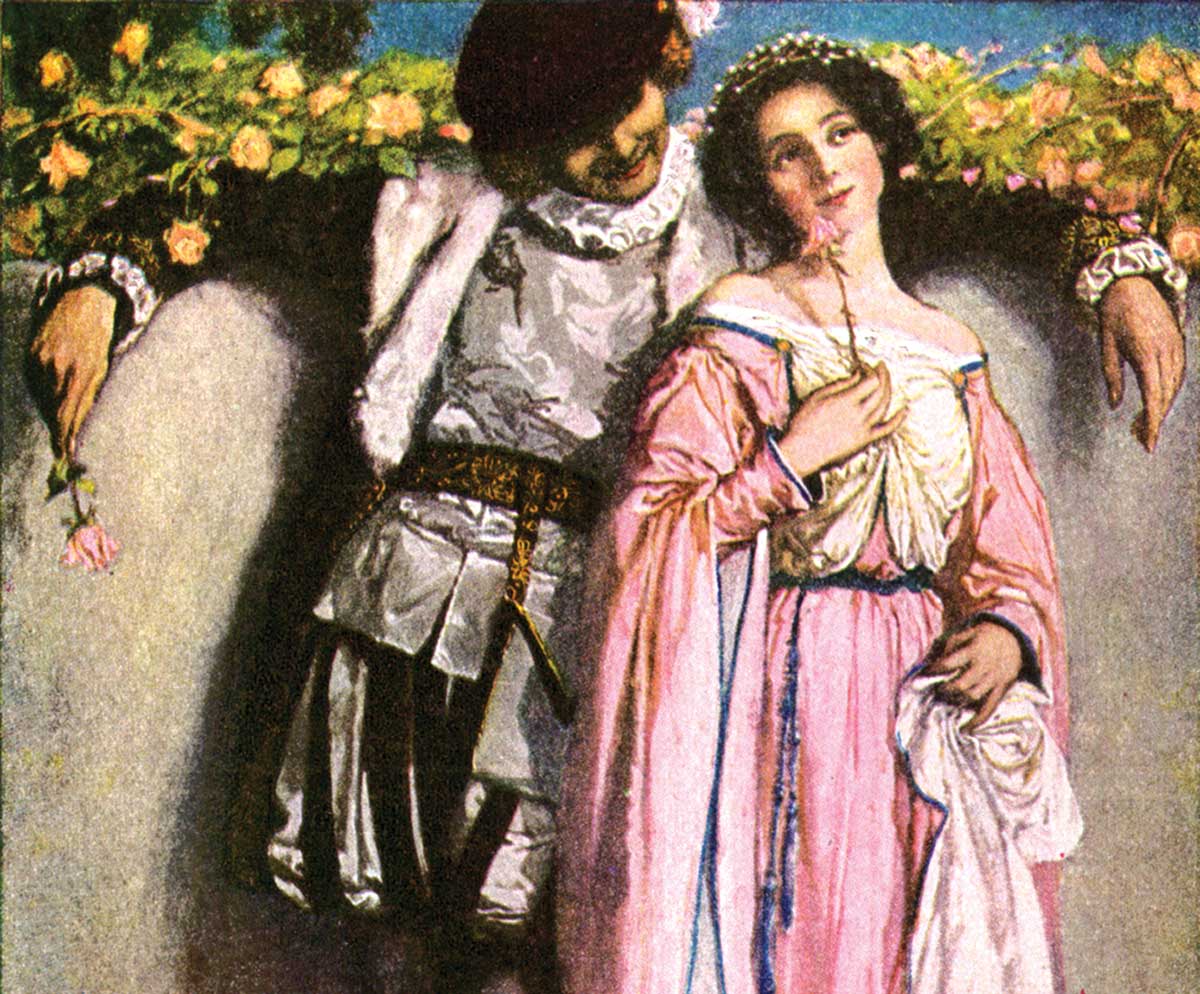Novel Bioethics
Claire Barshied on How a Book Taught Her to Reimagine Sex
It is a good bet that many Americans view bioethics as the exclusive province of academic specialists with prestigious degrees in philosophy, law, cell biology, embryology, and similar fields. Their esoteric debates over stem-cell harvesting methods and clinical trial review procedures seem removed from the real-world experiences of most people. Until recently, they certainly seemed that way to me. What few bioethical opinions I had—opposing cloning and abortion, for instance—were unconnected to choices I expected to face.
Then I read Being Human, a 600-page anthology of literature released by the President’s Council on Bioethics. What guidance could stories and poems offer on cloning and stem-cell research? In the book’s introduction, the council’s chairman, Leon Kass, explained that bioethics as currently conceived by professional bioethicists is much too narrow. It emphasizes what is technologically feasible, securing patient consent, ensuring access to care regardless of income, and so on, but ignores “the full range of human goods that we should be trying to promote or protect.”
Guarding that fuller range of goods requires a better grasp of what it means to be human and what good things humans prize. Our best sources on these questions are not scientists, but the writers and thinkers of the aptly named humanities. They are not everything, of course—who would entrust national science policy to John Updike and Joyce Carol Oates?—but perhaps they can point the way to deeper understandings of our nature.
Being Human’s editors hope that reading great literature can make bioethical arguments accessible. Stories embody the consequences of our choices, the tension between our aspirations and imperfections, what it means to love unconditionally, how we face sickness, loss, and death. And subjects such as these—“matters close to the core of our humanity,” as Kass puts it—can be profoundly changed by new technologies.
A book that illustrates these universal aspects of the human experience and that poses questions about their vulnerability should prompt us to think carefully about society’s embrace of biotechnologies. Such a book could even challenge us to examine more closely our own moral values and inclinations.
Our Common Nature
As I have been reading, thinking, and scribbling about Being Human for the past few months, I have been surprised to find some of my long-held assumptions being transformed. I have begun to see more deeply the importance of human design: In body, mind, and spirit, we seem to have some kind of common nature that defines and delimits us. When characters violate that design, they and others inevitably suffer.
Being Human excerpts the screenplay for Gattaca, a futuristic movie about a society in which ambitious parents can use in-vitro fertilization (IVF) technology to select the embryo with the best genes—the one without any diseases or “potentially prejudicial conditions” such as premature baldness, myopia, or tendencies to addiction, violence, or obesity. Children of the right sex, the right hair color, and the right predilections to music and mathematics can be ordered, and their genetic resumés open doors to education, careers, and marriage: After all, they are measurably more likely to succeed. For those conceived “naturally” the reverse is true; their less reliable genes close doors.
Science fiction? If only. Modern medicine is constantly refining its means of prenatal genetic testing. These tests are mainly used to determine whether the unborn child has any abnormalities, and as the Washington Post noted, “The majority of women who discover a serious disorder will terminate the pregnancy.”
Even more discriminating in its effects, in vitro fertilization allows embryos not yet implanted to be tested for 90 percent of common genetic disorders. Thus, as the Post noted, doctors can “report back to the patients on the apparent condition of each embryo and decide whether any of them should not be implanted in the mother’s womb.” Though no one can order certain eye or hair colors yet, several IVF clinics around the country already allow parents to choose the sex of their child. The technology will be refined still further, playing on the legitimate desire of parents to give their children every advantage, regardless of cost. At the same time, of course, these technologies emphasize the old eugenic idea that there should be minimum standards for those who get to be born.
Reflecting on Gattaca, though, I realized that the central problem was not the discrimination faced by the genetically inadequate characters. The trouble came long before, in the parents’ desire to control the outcome of procreation’s genetic roulette. Once procreation became fully separated from the sexual act, it looked less like the fruit of a couple’s love and more like manufacture—children stopped being unique gifts from God and became commodities of superior or inferior quality. The problem was that the natural relationship between sex and babies had been severed.
Literary warnings of this abound, most famously in Aldous Huxley’s Brave New World, but you need not look far in the real world of clinical reproduction to see the effects. IVF technology has removed sexual union from reproduction, prompted scientists to create embryos only to harvest their stem cells, produced the market for Ivy League donor eggs, and promoted selective abortion when multiple embryos become viable pregnancies at the same time. Further, embryos “left over” from IVF attempts and put into cold storage raise a host of bioethical questions (questions many mainstream bioethicists do not ask): Are they alive? Do they have anything that amounts to human dignity? Can they simply be disposed of like the overstock at a grocery? Do they have souls?
Personal Valences
But here is where this gets personal: When I first picked up Being Human, I was thinking only about the moral valences of other people’s decisions.
Still in my mid-twenties, I do not anticipate needing fertility aids any time soon. In fact, since I am newly married, contraception is a much more pressing concern. If severing the connection between sex and babies can create so many moral quandaries, and if it can upset social relationships so profoundly, I cannot help but wonder what effect it has on the sexual relationship itself. I have had to reconsider the implications of one of the most common biotechnologies in our society: the eminently respectable use of contraception.
It is not difficult to see the social effects of the mainstreaming of contraception in the last fifty years. By removing the responsibility of parenting from the sexual act, it opened the door to the Sexual Revolution: When there was a decent chance of pregnancy every time a couple engaged in sex, individuals thought longer about their partners and their promiscuity.
I can also see the influence of birth control’s acceptability in myself: Like nearly all other Americans, I feel that I have a right to have sex without the ever-present possibility of conception. Most churches I have attended highlight the role of sex in maintaining healthy, loving marriages, but they emphasize the bonding features of sexuality almost to the exclusion of the child-bearing aspects. And I have always assumed the Catholic Church’s opposition to contraception was simply medieval—a stubborn dogma that resigned poor people to ungovernably large families.
Back in Being Human, though, I ran across a provocative poem by Galway Kinnell. Titled “After Making Love We Hear Footsteps,” it describes a small boy who sleeps through all nighttime disturbances except his parents’ quiet lovemaking, which wakes him and sends him running into their bed to snuggle and sleep. I wanted to affirm the poem’s warmth toward the “familiar touch of the long-married,” as Kinnell puts it.
But I was disturbed that the poet thought it sweet, even good, that “habit of memory” propelled the boy “to the ground of his making,” in between his parents. It seemed almost disgusting to think of a third person involved, even only proximately, with sex; making love is for two people, between two people. And yet, thinking further, I started to question my own reactions: Why wouldn’t there be a mysterious connection between making love and a child? That, after all, is the pattern of human reproduction—intimacy between two lovers becomes parental love. Babies follow sex.
Stripping the Mystery
What is more, I have begun to suspect that God’s design for procreation, as in so many other areas of life, might contain hidden blessings. In the poem, the parents’ lovemaking grows deeper, infused with new affection and wonder, with their son’s appearance: “In the half darkness we look at each other and smile and touch arms across his little, startlingly muscled body.” The son, too, benefits by the stability and love of his family, “his face gleaming with satisfaction at being this very child.”
Do we miss some of the good gifts of marriage, sexuality, and family by stripping out the procreative mystery of sex? The poem portrays a family flourishing through connections that are greater than themselves; its spirit is one of awe and gratitude, the very opposite of the need for control we so often require.
Is there something to be gained from assigning a lower priority to our individual, immediate desires? Perhaps sex is inherently about more than just two people, involving more than just pleasure and bonding. Reuniting sex and procreation would protect against the temptations of genetically screening for “acceptable” children and other kinds of surreptitious eugenics. Indeed, the poem’s son, regardless of his characteristics, is “this blessing love gives again into our arms.”
So where does this leave my husband and me, as we begin both our marriage and busy careers in a big city? I cannot say I know God’s stance on every form of birth control. Thinking about what it means to be human, though—and what it means to be obedient to the design a good God gave us for our benefit—has led us into a much larger project of re-imagining sex; in a surprising turn, I found myself driving out to a Catholic church once a month for Natural Family Planning classes.
This is just the beginning, I know, of a long and unexpected journey, but at the moment I’m content to marvel at God’s mysteries, wonder about our nature, and try to get the most out of being human. •
The table of contents of Being Human can be found at www.bioethics.gov/bookshelf/reader/table_of_contents.html.
Claire Barshied is a freelance writer in New York City. After receiving a degree in English and American Studies from Princeton University, she worked as a research assistant at the Heritage Foundation (www.heritage.org) in Washington, D.C. She and her husband currently attend Redeemer Presbyterian Church.
subscription options
Order
Print/Online Subscription

Get six issues (one year) of Touchstone PLUS full online access including pdf downloads for only $39.95. That's only $3.34 per month!
Order
Online Only
Subscription

Get a one-year full-access subscription to the Touchstone online archives for only $19.95. That's only $1.66 per month!
bulk subscriptions
Order Touchstone subscriptions in bulk and save $10 per sub! Each subscription includes 6 issues of Touchstone plus full online access to touchstonemag.com—including archives, videos, and pdf downloads of recent issues for only $29.95 each! Great for churches or study groups.
Transactions will be processed on a secure server.
more on sex from the online archives
more from the online archives
calling all readers
Please Donate
"There are magazines worth reading but few worth saving . . . Touchstone is just such a magazine."
—Alice von Hildebrand
"Here we do not concede one square millimeter of territory to falsehood, folly, contemporary sentimentality, or fashion. We speak the truth, and let God be our judge. . . . Touchstone is the one committedly Christian conservative journal."
—Anthony Esolen, Touchstone senior editor












